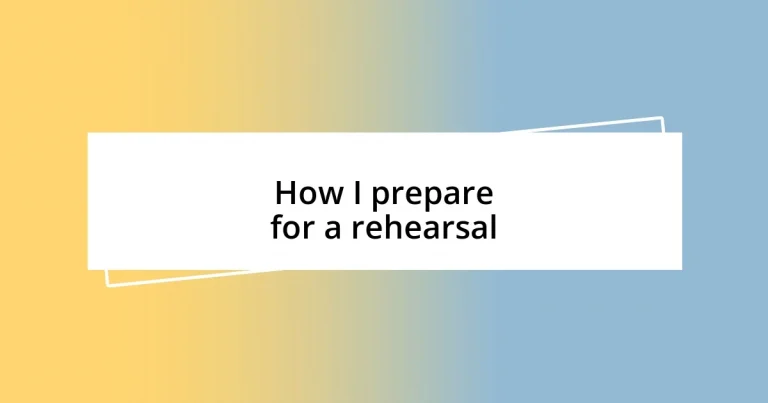Key takeaways:
- Setting clear goals for each rehearsal enhances focus, camaraderie, and collective progress.
- Creating a detailed schedule with structured time and breaks improves time management and energy levels during rehearsals.
- Encouraging open communication and adapting based on feedback fosters trust and leads to meaningful improvements in performance.
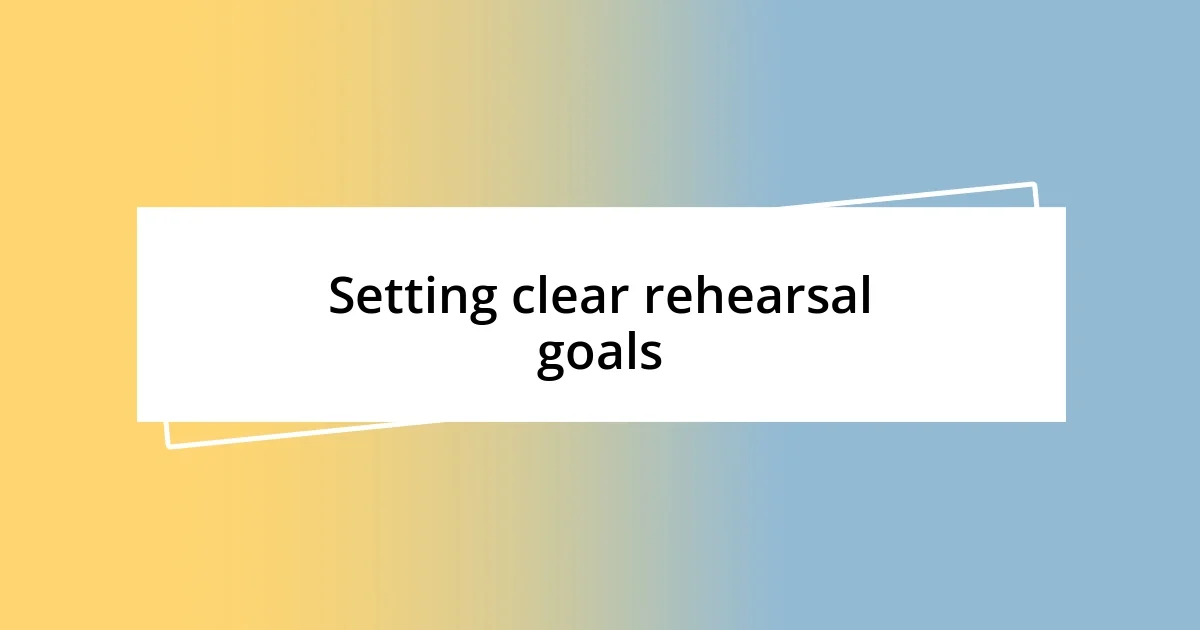
Setting clear rehearsal goals
Setting clear rehearsal goals is essential to ensure that every practice session is productive. When I prepare for a rehearsal, I often reflect on what I want to achieve—whether it’s mastering a particular section or improving group dynamics. This focus helps keep my energy aligned with our collective objectives, so we move forward instead of merely going through the motions.
I remember a rehearsal where we had an ambitious piece to tackle, but instead of aiming to play it perfectly, we set a goal to identify and work through three challenging spots. At the end of the session, we didn’t just feel accomplished; we felt a sense of camaraderie as we tackled the piece together. Have you ever noticed how much more satisfying it is to actually see progress rather than just play the same piece over and over without direction? That feeling of achievement creates a more inspiring environment.
One time, I found that setting a goal around emotional expression made a world of difference. By deciding to embody a specific feeling during a particular section, I not only connected more deeply with the music but also drew my fellow performers into that experience. It’s fascinating how a clear goal can shift the energy in a room—suddenly it’s not just rehearsal; it’s a shared journey toward a richer performance.
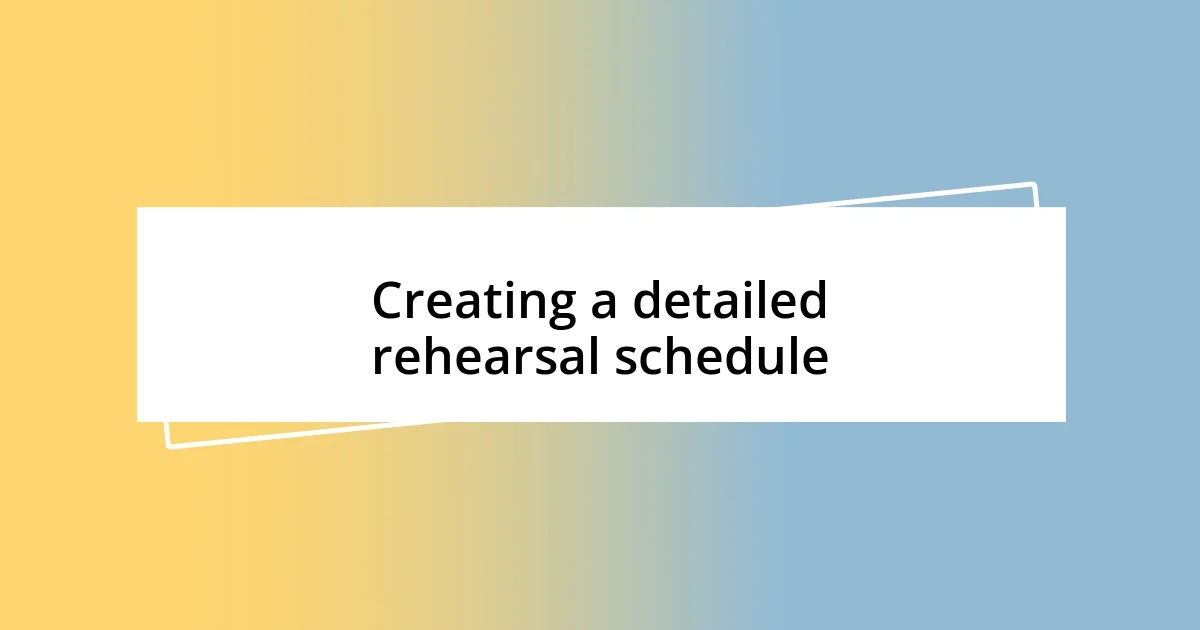
Creating a detailed rehearsal schedule
Creating a detailed rehearsal schedule is crucial for maximizing our time together. I remember once when we had a tight deadline for a performance, and I put together a schedule that broke down each piece into manageable sections. It was amazing how much more focused we were. We completed complex sections in half the time by knowing exactly what we would tackle each day. Have you ever noticed how having a clear plan can transform a chaotic rehearsal into a seamless workflow?
Another time, I learned the importance of including breaks in the schedule. I initially crammed every minute with practice, thinking more time meant better results. But after a sweaty rehearsal that left everyone drained, I decided to space out short breaks. The energy shifted; we returned from breaks refreshed and more engaged. This taught me that downtime is just as important as the rehearsal itself.
Lastly, I always make an effort to share the schedule with everyone in advance. There was a moment when the group was caught off guard because they didn’t know which sections to prepare ahead of time. It led to unnecessary stress. By making sure everyone knows what’s coming, I’ve found that my teammates come to rehearsals not just prepared, but excited to dive in. Isn’t it wonderful how a simple act like sharing a schedule can build anticipation and harmony in the group?
| Aspect | Traditional Approach | Detailed Schedule |
|---|---|---|
| Focus | General Goals | Specific Sections |
| Time Management | Unstructured | Structured Time Blocks |
| Energy Levels | Can Become Drained | Includes Breaks for Refreshment |
| Preparation | Surprise Elements | Shared in Advance |
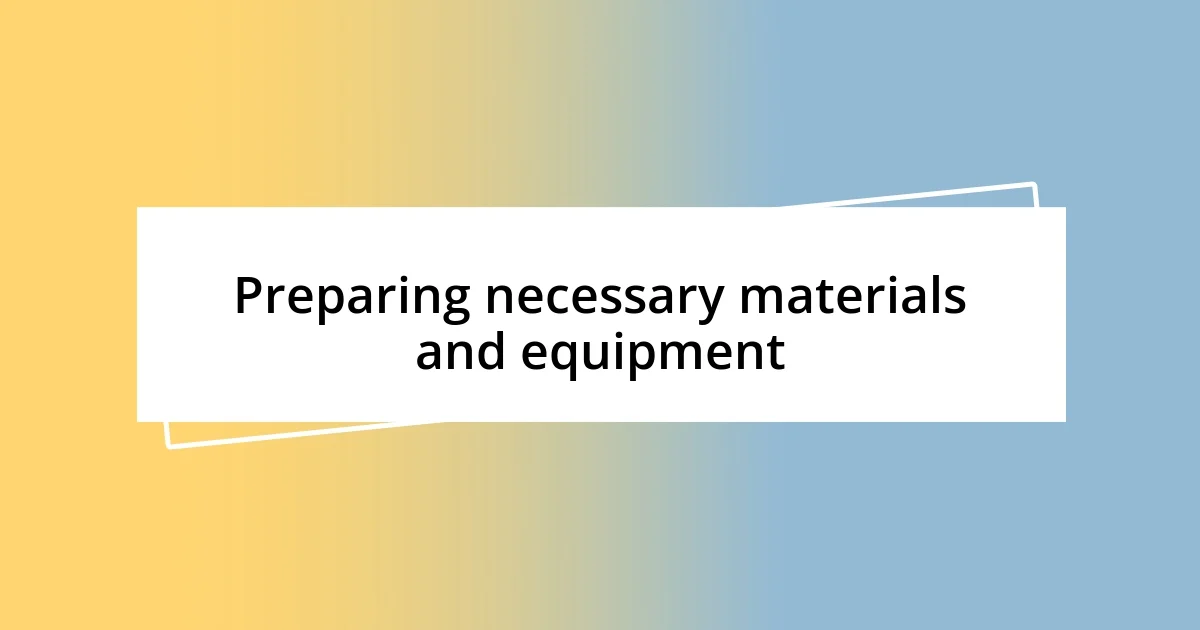
Preparing necessary materials and equipment
Preparing the necessary materials and equipment for a rehearsal is a vital step that I never overlook. In my experience, gathering everything beforehand brings a sense of calm and readiness. I remember one rehearsal when I forgot my tuner. It was a disheartening start, and the whole session felt off. From that day, I made a checklist that I reference before each rehearsal. It’s become my safety net, ensuring I have everything within arm’s reach.
Here’s a quick rundown of what I usually prepare:
- Instruments (tuned and in good condition)
- Sheet music (properly organized, with annotations if needed)
- Metronome/tuner (to keep us on track)
- Water & snacks (keeping energy up is essential)
- Additional equipment (i.e., amplifiers or mics for specific pieces)
Taking time to prepare these materials not only keeps me organized but also sets a professional tone for the group. It’s amazing how much more confident I feel when I know everything is in place, ready for us to dive in. Preparing well translates to a smoother, more focused rehearsal where creativity can truly shine.

Warm-up exercises before rehearsal
When it comes to warm-up exercises before rehearsal, I can’t stress enough how they set the tone for our practice. I remember a particularly chilly morning when we decided to skip our usual stretches and vocal exercises. The result? A sluggish start that impacted our focus throughout the session. I often find that dedicating just ten minutes to a series of dynamic stretches and vocal warm-ups energizes the group, creating an atmosphere of readiness. Have you ever felt the difference a little movement makes in your performance?
I typically start with simple physical stretches that target tense areas like the neck and shoulders. I recall a moment when I introduced a group breathing exercise, focusing on deep inhalations and slow exhalations. It was fascinating to see how everyone’s posture improved, and not just in the physical sense; suddenly, the energy in the room shifted to a more collaborative space. It’s incredible how intentional breathing can enhance our connection and focus. Do you feel that feeling of unity as you breathe together?
Vocal warm-ups are another pillar of my pre-rehearsal routine. From lip trills to scales, these exercises have a profound impact. I once observed a member of my group struggling to hit certain notes at the start of a rehearsal. After just a few vocal exercises, I saw their confidence soar, making a noticeable difference in their performance. Each warm-up serves as a gentle reminder that we need to engage our full range—both physically and vocally. Does warming up resonate with your own experience in building confidence and readiness?

Effective communication with the team
Effective communication with the team is crucial for a successful rehearsal. I’ve found that having a brief huddle before we start really helps us sync up. I once led a rehearsal where everyone was in different pages regarding our goals for the night. The confusion we faced could have been avoided with just a quick five-minute check-in, allowing us to share thoughts and align our intentions. How do you usually get everyone on the same page?
Encouraging open dialogue throughout practice keeps everyone engaged and motivated. During one rehearsal, I noticed a quieter member struggling to express their ideas. By creating an environment that welcomed questions and suggestions, the dynamic shifted radically. They quickly opened up, offering fresh perspectives that enriched our session. Have you observed how different voices can change the sound of a group?
Regular feedback sessions can significantly enhance our cohesion. After a rehearsal last month, I implemented quick feedback rounds where each member shared one thing they loved and one for improvement. Initially, I was nervous about how this would be received. However, the honesty and trust that blossomed from those discussions were astonishing. It’s powerful how sharing insights can not only lead to growth but also foster a deeper bond among the team. What strategies have you found effective in fostering that sense of trust?

Adapting based on feedback
Adapting based on feedback is essential for me during rehearsals. In my experience, I’ve learned that constructive criticism can be a game changer. After one particularly intense rehearsal, I mentioned to my team how a few members seemed to be hesitating during a key scene. Their input opened my eyes to underlying issues I hadn’t noticed, like a lack of clarity in direction. Have you ever found that feedback revealed something you missed?
I remember a moment when a colleague suggested altering the tempo of a piece we were performing. Initially, I was hesitant, thinking it might disrupt our synchronization. However, when we tried it out, it added a fresh layer to our performance that I hadn’t anticipated. The energy in the room shifted dramatically, and that small change allowed everyone to express themselves more freely. It’s incredible how being flexible and receptive to feedback can lead to unexpected breakthroughs, don’t you think?
Moreover, I always encourage my team to provide anonymous feedback after each rehearsal. This approach has been eye-opening. I once received a message highlighting that certain cues I used were unclear, which was hard to digest at first. However, embracing that critique helped me refine my directing style significantly. The connection we build through honest communication not only enhances our rehearsals but also deepens our trust as a collective. Have you ever considered how much easier it might be to improve when you embrace vulnerability?
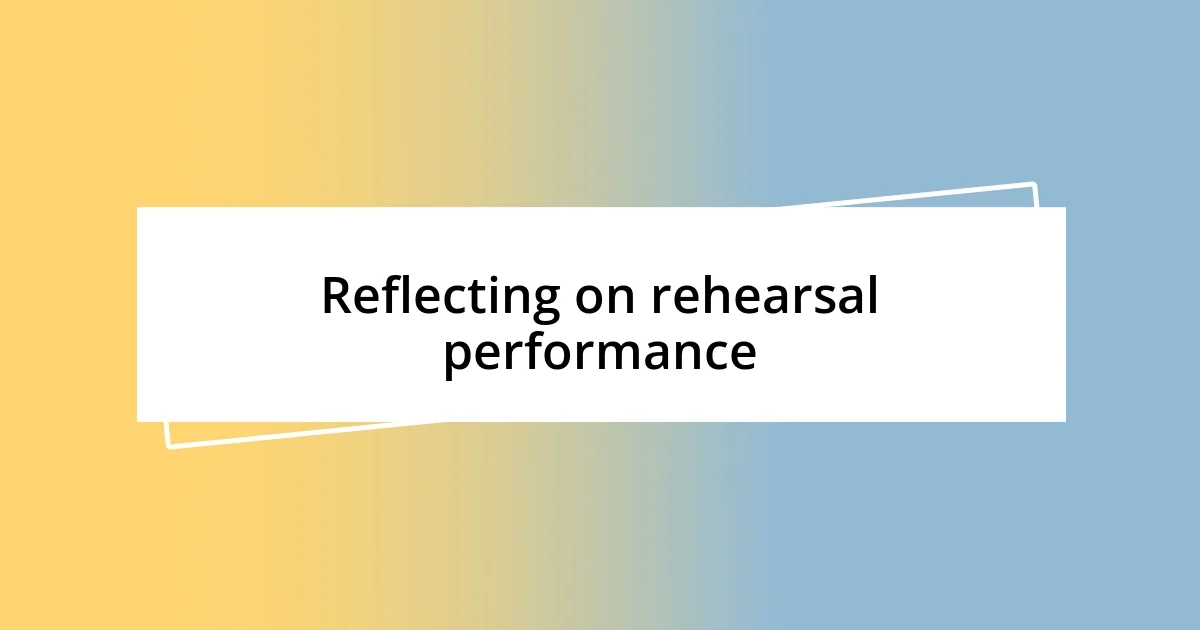
Reflecting on rehearsal performance
Reflecting on rehearsal performance is a nuanced process that can really shape the way we move forward. After a particularly challenging rehearsal, I found myself replaying moments in my head. Did I communicate my vision clearly? Was I able to inspire my team, or did I unintentionally bring the energy down? These reflections often reveal crucial insights that can either bolster our confidence or highlight areas for growth.
On another occasion, after a rehearsal where we struggled with timing, I took the time to journal my thoughts. Writing about what went well and what didn’t gave me a clearer perspective. I realized how much I appreciated the team’s resilience, yet acknowledged that we needed more practice with our transitions. Reflecting like this not only helps in pinpointing specific issues but also allows me to celebrate the small victories that occur along the way. Have you ever considered how writing down your experiences might deepen your understanding?
Finally, gathering the team afterward to discuss our collective experiences creates a rich dialogue about our performance. I once initiated a sharing circle after a rehearsal that didn’t quite hit the mark. Although it felt vulnerable to open up about our shortcomings, the conversation led to unexpected breakthroughs. I discovered that others shared my feelings of frustration, and together we transformed those feelings into actionable steps for improvement. Isn’t it fascinating how mutual reflection can cultivate a culture of growth and support?












